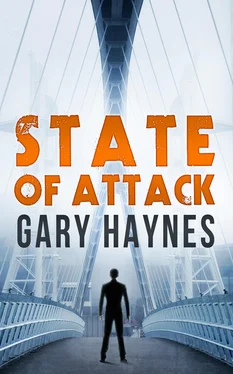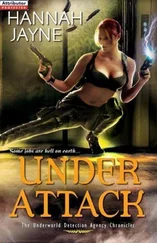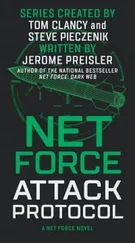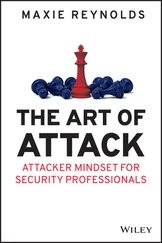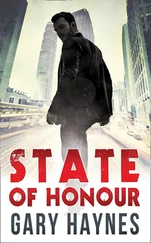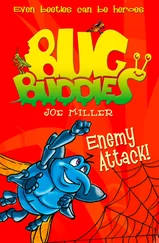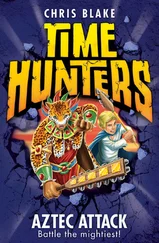The fighter ducked through the doorway to avoid the swinging lintel before pivoting around to face the street. He was bearlike, the sleeves of his combat jacket rolled up, revealing thick forearms covered in dark matted hairs. His head was wrapped in a black bandana, the hallmark of al-Qaeda-inspired militants. Basilios knew that the noise from the discharge of small-arms fire and the shouting and screams of battle would mask his steps, but thick beads of salty sweat rolled down his forehead and into his eyes as he began to move forwards.
At the last moment, the man clearly registered Basilios’s presence and, turning his head, he began to swing his assault rifle around. Basilios hit him hard in the exposed floating rib with the stock of his AK, winding him. He cracked his skull with the AK’s metal butt. Dazed, the Salafist buckled, and knelt in the dust, his head lolling to one side.
Basilios wrapped his arm around the bull-like neck and jerked him up with great force before dropping to the floor. There was a strangely intimate crack as Basilios fractured the man’s C2 vertebrae as if it was parched wood. The burly body went limp, and Basilios eased the dead man’s head to the rubble. But it had been the first time he’d killed a man so close up that he could feel his last breath leaving his body. It left him feeling both energized and shattered.
He moved to the other side of the building, careful to avoid the electricity cable that had fallen through the shattered roof and lay doglegged on the floor. The cable’s live end vibrated and popped and fizzed, evidencing that the portable generator was still intact, or at least functional.
He crouched by a shell hole, listening to the small-arms ricochets and the shrieks from the wounded. He saw two helmeted fighters dragging a boy of no more that fifteen by his hair from the remnants of the wooden shack opposite. They wore green flak jackets and wraparound shades, their postures menacing. The boy was weeping and pleading for his life. They propped him up against a concrete wall and, as he covered his face with his hands, they stepped back and raised their carbines.
Basilios knew the boy’s father, a decent man, who plied his trade as a mechanic among the surrounding towns and villages. He did his best to rationalize the situation, but as they reversed their short rifles, about to bludgeon the kid to death with the metal butts, he took aim and fired at their legs, three rounds each. As they collapsed to the floor, he saw the side of the boy’s head explode in a mass of blood and bone fragments.
Devastated, he scanned the flat roofs above and saw a sniper edging back behind a pile of plastic chairs before turning and half crawling towards the adjoining building.
Basilios glanced around the doorway, telling himself that he would mourn the boy later. Those townsmen who hadn’t fled were dead or dying. There was nothing to be done except to try to survive and then join up with the women and children in the hills. Perhaps I will be able to lead them to safety? he thought.
They couldn’t return to the town, that was for sure. In those towns and villages where the Sunni Islamists had taken control, it’d been a liberation that had turned into a religiously-motivated occupation. People received forty lashes for stealing, and teenagers were beheaded for voicing a barely inappropriate reference to the Prophet. Sharia law had been imposed with a dogmatic ferocity. He didn’t want to imagine what it would be like for a Christian town.
Move, he thought. Keep moving or die.
Chapter 4
Twenty minutes later, Pouter emerged onto the sidewalk again, her hips still doing the swinging routine. One of the Russian security detail, a blond guy with sloppy lips and tombstone-grey eyes, who looked as if his mother had substituted breast milk for protein shakes fortified with creatine, held four meringue-coloured paper bags dotted with little lilac flowers.
Tom guessed they held shoe ware worth more than he made in months. But the bags looked absurdly incongruous, and he shot one of his team a disdainful stare as the guy was about to snigger. Ed Swift, a rookie agent from Kansas, who was yet to get a scratch on active duty. Truth was, Tom had to repress a smirk, too. The Russians were kind of touchy about such things.
The rear door to the limo was opened and Pouter slid in. Tom breathed a sigh of relief and ordered his team to mount up via his PTT. He sat in the front of the SUV next to the driver, Sam Collins, a veteran DS agent, who Tom had worked with on three foreign-embassy assignments and trusted like a brother.
Sam had shaved what was left of his hair. He stood six-four and two hundred and twenty pounds, most of which was functional muscle. At fifty, he could still down most of his fellow agents before they’d finished clenching their fists. As he pulled away from the kerb, Tom opened up a secure laptop and checked the route ahead via images sent from a small UVA, an unmanned surveillance drone, which was being controlled by an ex-US Air Force pilot at the nearby Marine Corps Base Quantico.
The ride back to Blair House was smooth, the Russian vehicles moving in a convoy up front. Tom watched Pouter exit the rear limo and strut over the few paving slabs to Blair House, the tricolour of the Russian Federation flapping on a flagpole in the centre of the building. The building had a beige-coloured limestone facade, with green shutters. It was one of four connected terraced townhouses that made up the one hundred and nineteen-room complex.
When she’d gotten safely inside, Tom and his team could relax. Their remit didn’t extend to guarding the exterior, let alone protecting her inside her suite. A fresh DS team would ensure the perimeter was secure for the dayshift, and the Russians looked after their own at close quarters.
As Pouter walked up the steep steps with her bodyguards, sheltered from the light rain that had begun to fall by the dark green canopy, Tom was glad it was home time for him, too. But as she got just a couple of yards from the door, it was flung open abruptly. A suited man barged out, brandishing a handgun, and Tom willed the Russian bodyguards to fill the space between them and his charge, to fling her to the rear and pump ten rounds into the guy’s chest.
He barked a series of short orders via the PTT and hit the emergency button under the dash. That sent an ultra-quick response requirement to the local PD, the Secret Service, the FBI and the DS. The SUV’s four heat-seeking cameras clicked into 360-degree vision for the various agencies that were now surveying the scene on video screens, just in case the hovering low-level drone got knocked out or malfunctioned. But by the time his team were halfway to the flight of steps, with their SIGs drawn, he could see that the Russian agents had holstered their own handguns.
He held up a field scope and recognized the face of the ostensible attacker from his briefing photos. The man was in fact the Russian president’s fifteen-year-old nephew and the handgun was a squirt gun that he was now firing into the face of the hulk carrying the shopping bags.
The kid had a mental age of nine, according to Tom’s security briefing notes, and that meant that all anyone would feel would be sympathy. Still, his team had reacted well, even Ed the rookie. Drills had their place in producing long-term muscle memory and instinctive positive action, but there was no substitute for a real test. He radioed his team to stand down and called it in before making a mental note to pat Ed on the back and say a quiet encouraging word.
Suddenly, he felt overcome with exhaustion. He hadn’t had a day off in a month due to a minor epidemic of flu at the Washington office. His father, a recently promoted three-star general who worked at the Pentagon, was in Ankara, Turkey, at present, but he was due back in a week’s time, and Tom had arranged to take a short, well-deserved vacation to spend some downtime with him.
Читать дальше
